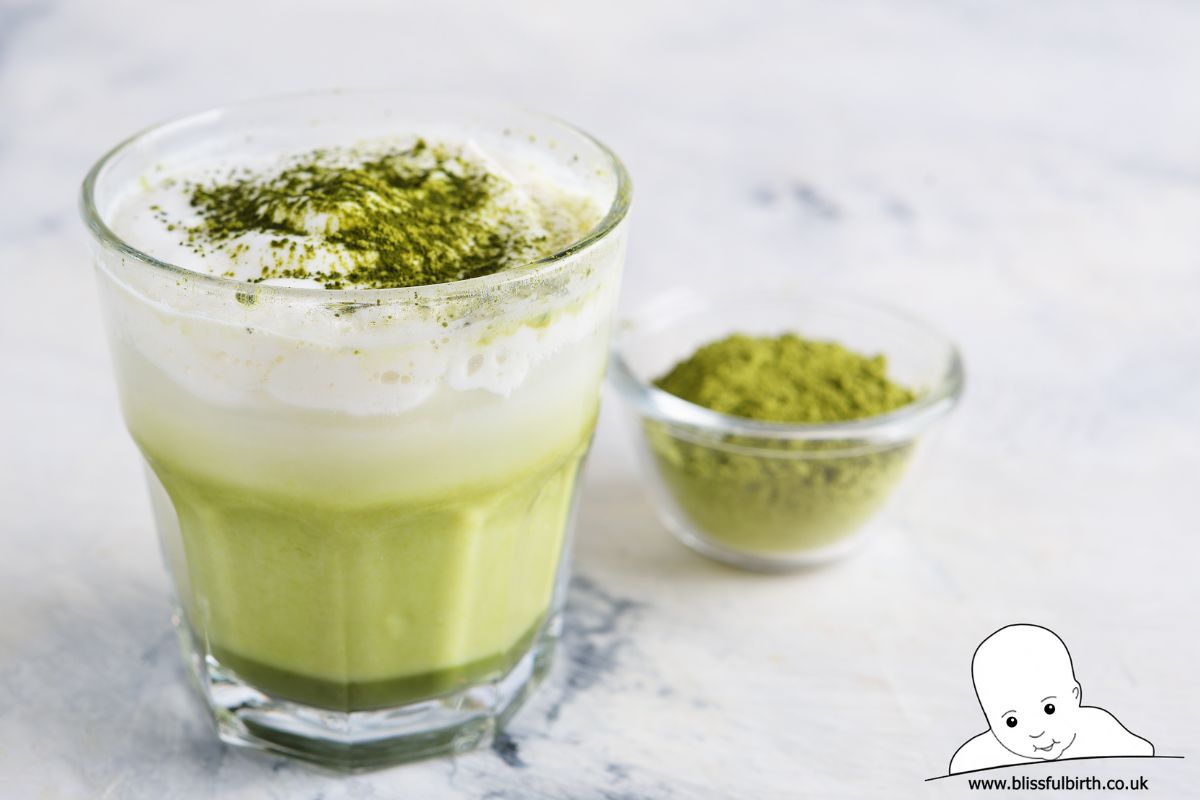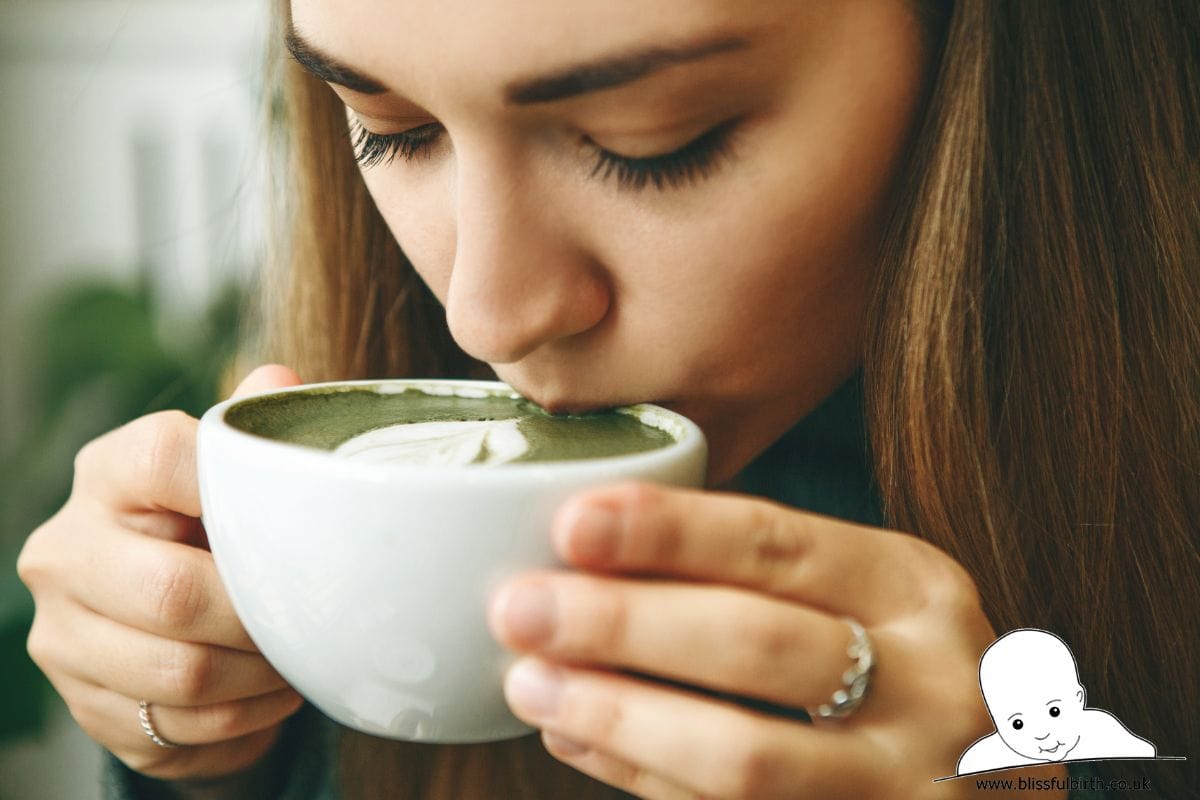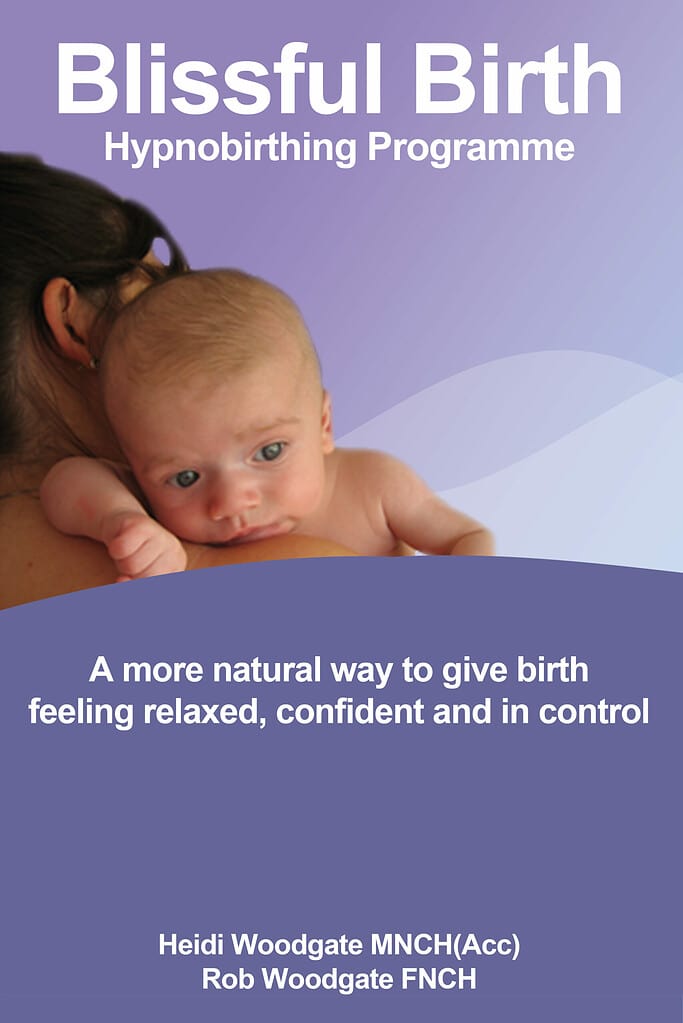Pregnancy brings a lot of changes and challenges for expectant mothers – both physically and mentally – and it is normal to feel lost and have a thousand different questions, especially as a first-time mom!

You probably already know that you need to avoid alcohol, raw fish, soft cheeses, and cigarettes while pregnant, but can you drink matcha during pregnancy?
The short answer is yes, you can drink matcha while pregnant. Matcha is completely safe for expectant mothers when consumed in moderation.
You should keep in mind that 1 gram of high-quality matcha contains between 35-50 mg of caffeine.
That said, you should have no problem staying well within the recommended limit of caffeine for expecting mothers, which is 200mg a day.
To put this into perspective for you, you would need to drink two large cups of matcha green tea a day which consists of a teaspoon of matcha powder in each one.
With this in mind, this guide will explore everything you need to know about the role of matcha powder in an expectant mother’s diet.
Table of Contents
What Is Matcha Tea?
Matcha is a variety of green tea that is made from grinding tea leaves to create a fine powder.
Unlike other types of tea, it is made and consumed whole, as opposed to being steeped in water and then thrown away.
As a result, matcha typically contains higher levels of antioxidants and caffeine as opposed to traditional green tea.
Matcha tea is usually made from organic tea leaves cultivated in Japan – it is generally referred to as the highest quality tea you can get.
The ingredients to make matcha tea are simple: hot water and high-quality tea leaves. Some matcha powders contain added flavorings and sugars.
That said, you can purchase matcha without any additives, too.
Is Matcha Safe During Pregnancy?
As previously mentioned, matcha is completely safe to consume during pregnancy. That said, it is important to remember that it contains caffeine, too.
While a regular cup of green tea contains around 30 mg of caffeine, matcha tends to be naturally more concentrated.
Plus, baristas and different brands may contain different concentrations of matcha.
Therefore, a typical serving of matcha can contain anything from 30 to 80 milligrams of caffeine.
According to the Public Health Agency of Canada, pregnant women should keep their caffeine intake below 300 mg a day.
On the other hand, the American College of Obstetrics and Gynecologists recommends you keep this below 200mg a day.
Therefore, it is always important to read the labels carefully and ask questions when considering the serving size of your matcha.
In fact, there have been some reports outlining that drinking green tea can affect your body’s ability to absorb folic acid – this is important for fetal development, particularly in the early stages!
In a study created by Boston University, they used 7,000 women across North America to determine that as long as you keep your match intake below three cups a day, you shouldn’t notice any differences.
Plus, even though matcha has a lot of health benefits – like green tea – it is important to keep an eye on how much you’re consuming.
For instance, are you adding flavored syrups and getting some whipped cream on the top? Then it is now considered a dessert.
While there is nothing wrong with dessert, it is something you might want to consider if you’re dealing with gestational diabetes or watching your blood sugar level.
How Much Matcha Can You Drink While Pregnant?

While pregnant, you can consume up to three cups of moderate matcha.
Here, three cups are used as a guide to help prevent you from drinking too much caffeine or from potentially blocking any essential nutrients.
According to the studies mentioned above, matcha is regarded as safe to consume in moderate amounts.
Scientists consider less than four cups to be a moderate amount of matcha. This was based on the amount of iron interference, folate, and caffeine content in matcha.
You should also remember that caffeine tends to be more caffeine dense than other drinks. For instance, matcha contains approximately 18.9 to 44.4mg of caffeine per gram of tea.
On the other hand, green tea contains 11 to 25mg of caffeine per gram of tea. Likewise, coffee contains 10 to 12 mg of caffeine per gram of coffee.
When it comes to pregnant women, the most popular medical advice is to limit your caffeine intake to 200mg (0.007oz per day.
What Are The Benefits Of Matcha For Pregnant Women?
Despite having a few drawbacks, there are a lot of benefits to drinking matcha. The antioxidants found in matcha help with inflammation that pregnant women are most at risk of.
Likewise, matcha has been known to prevent some cancers, coronary disease, bone loss, and stroke. Like some other green teas, it also has polyphenolic compounds, too.
These groups of molecules are known to share the same antioxidant properties. For instance, this includes catechins. The only drawback to this is that it is known to block folate absorption.
Therefore, while there are tons of benefits to drinking matcha, there are some drawbacks, too. Healthy consumption of matcha is all about moderation.
Is It Safe to Drink Decaf Coffee While Pregnant?
Is it safe to drink decaf coffee during pregnancy? While regular coffee contains caffeine, decaf coffee is virtually caffeine-free. However, it still contains a small amount of caffeine. Experts suggest that drinking decaf coffee during pregnancy in moderation is generally considered safe. It is always wise to consult with your healthcare provider for personalized advice.
Final Thoughts
Matcha is a delicious drink that features a vibrant green color known to provide you with a host of benefits.
During pregnancy, there are a lot of restrictions to what you can and can’t eat. Therefore, you may be skeptical about drinking matcha, especially because it contains caffeine.
If you’re a matcha lover, then you’re in luck! It is perfectly safe for women to drink matcha. That said, this consumption should be limited to fewer than three cups a day.
If you stick to these guidelines, you should be able to enjoy matcha without worrying about it affecting your baby.
Hopefully, this guide has informed you on everything you need to know about matcha and its role in a pregnant women’s diet.




